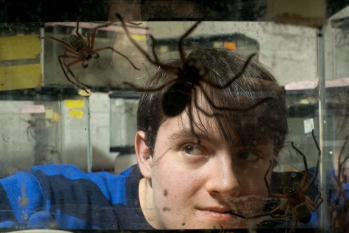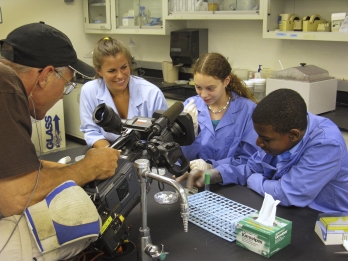COVER STORY
Undergrads seek to change the world through research
(Page 4 of 6)The program is now called the Hunter R. Rawlings III Cornell Presidential Research Scholars program in honor of the man who has helped forge Cornell's dominant national role in undergraduate research.
Currently 200 students participate in the program, in which undergraduates collaborate with faculty to design an individualized program of research. Recent projects have included studies of music and cognition, radiation in neutron stars, professional pay scales among university professors, field work in Hawaii and New York City, and projects in architecture, the social sciences, biology, human development, physics and genetics. Many projects are interdisciplinary -- bridging the gaps between disciplines and bringing fresh perspective to traditional subjects. The research can take place in the lab or at the computer -- in the mountains of Central America, the library archives or the design studio. Anyplace, really, where there are secrets to uncover.

Anthony Auletta '10 studies social behavior of huntsman spiders in senior research associate Linda Rayor s lab. See larger image
Across the disciplines
"We have a really broad scope of research," says Brenda Bricker, director of leadership and undergraduate research in the College of Human Ecology. Bricker's office works with students in fields from biology to apparel design, raising awareness about research opportunities, helping students identify faculty whose work they find most interesting and presenting their research interests to the professors, and finding funding from a variety of sources.
Which raises the question: What exactly is research? Download a brochure for the Cornell Undergraduate Research Board, and you'll find the dictionary definition: Scholarly or scientific investigation or inquiry; close, careful scrutiny. In the Office of the Vice Provost for Research, Yorke calls it "experiential learning with a goal toward developing new knowledge." Thus, traditional test-tube experiments qualify, but so do investigations of prison inmates' access to courts or the viability of biofuels as an efficient energy source. Compensation is equally flexible. Many students volunteer to get experience and perhaps a faculty recommendation for graduate school; others also receive course credit.
Student Garcia from Puerto Rico says her life has definitely been changed by the research experience. "It's rewarding to be actively involved in work that could save unique species around the globe. Disappearance of a single species can have countless effects on other species, including humans. Working on understanding Bd can help us develop methods to conserve amphibian diversity and, in the long term, prevent chain reactions that will otherwise result in loss of species related to amphibians."

Hekia Bodwitch '09, left, in a human ecology lab with local students last summer during the filming of an episode for the PBS children's show DragonflyTV . In the episode, which will air in April, Bodwitch appears as a guest scientist and demonstrates how socks made with silver nanoparticles can kill bacteria. Bodwitch conducts undergraduate research on nanoparticles with Juan Hinestroza, assistant professor of fiber science and apparel design. See larger image
The work itself is valuable in other ways, she adds. "Research is a way of exercising the mind. Every day you are faced with vast amounts of information, and as a researcher, you must decipher its meaning in terms of cause, effect and solutions to the issue of interest -- in my case, amphibian massive extinctions," she says. "At a more personal level, research promotes critical thinking and expands the ability of dealing with new situations" -- both skills that apply to life in nearly every sense.
Student research crosses all disciplines, and the humanities are well represented. Says Tim Murray, professor of comparative literature and English and director of the Society for the Humanities: "What we try to instill in Cornell undergraduates in the humanities is the value and delivery of focused and extensive research in their fields of study. This can range from exploration of original manuscripts in rare book libraries to studies of cities, cinema systems, interrelationships between science and literature, science and philosophy."